George W. Bush’s Rehabilitation
61 percent of Americans have a favorable impression of a man who left office a failed president.
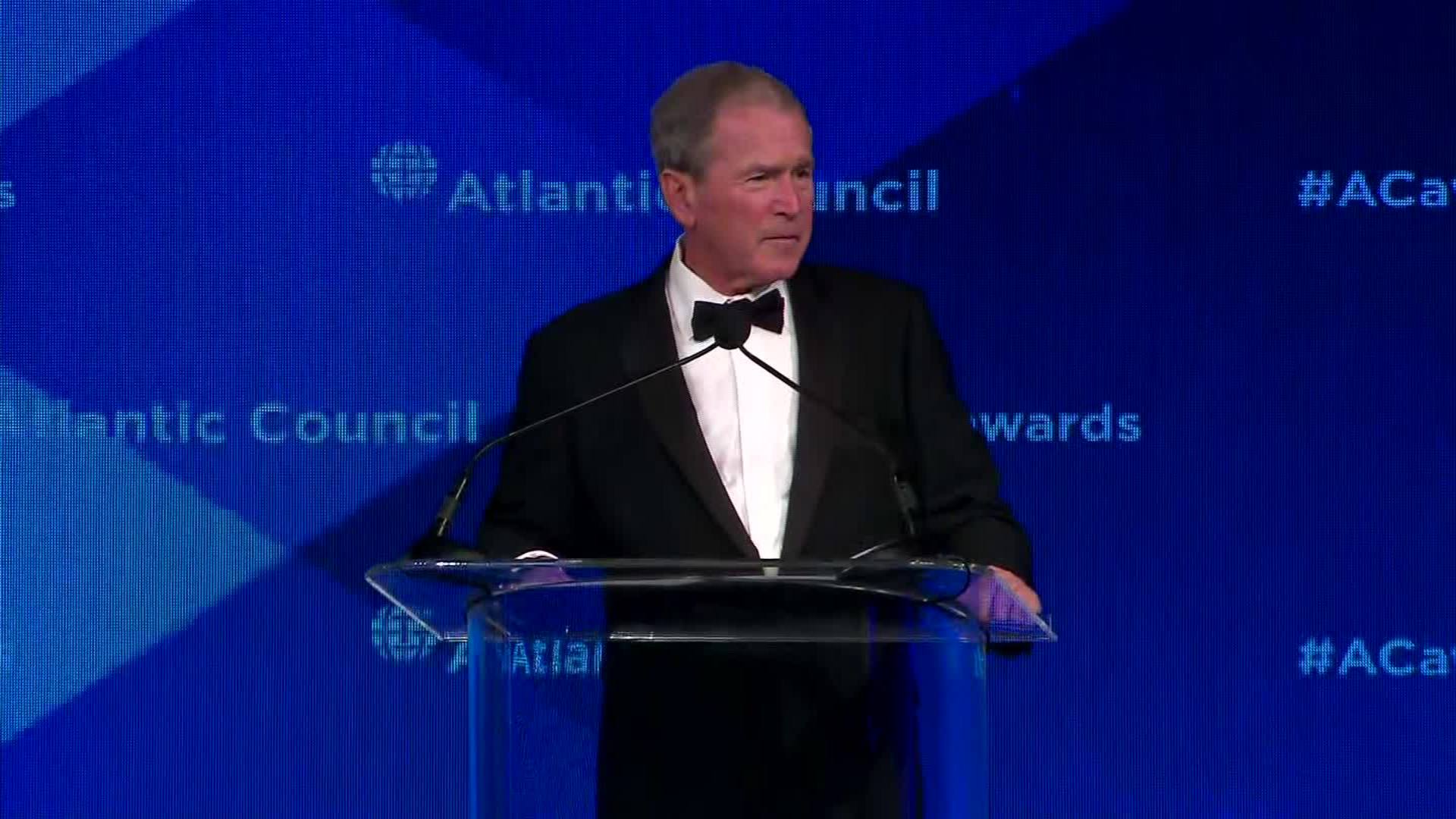
WaPo (“Donald Trump may be the best thing that ever happened to George W. Bush“):
George W. Bush received three standing ovations last week, the first for the mere mention of his name.
Bush was in town for the Atlantic Council’s annual fundraiser, where he received the Distinguished International Leadership Award from the influential think tank. More than 800 guests from 70 countries — including former presidents, prime ministers and military leaders — gave the 43rd president a warm, enthusiastic welcome.
He was introduced via video by former secretary of state Condoleezza Rice, who said, “Ultimately, true leadership requires being, deep down, a good person.”
Bush responded with vintage Dubya: self-deprecating jokes, references to his mom and dad, and highlighting the importance of global diplomacy — specifically his administration’s work on the AIDS crisis. “I’m honored to get this award,” he told the audience. “I’d really like to dedicate it to the generosity of the American people and ask you to spread the word about what this great compassionate nation has done.”
He did not mention Iraq, nor did anyone else on this night of celebration.
“Time has done the reputation of President Bush a lot of good,” said Fred Kempe, president of the bipartisan Atlantic Council.
The organization has considered giving Bush the award for the past few years, but the Iraq War was always the stumbling block. This year, the jury looked at his work fighting AIDS, his foreign policy in Africa, and his leadership in the aftermath of the 9/11 attacks. “Our conclusion was that, the longer time goes on and his presidency is reassessed, the better he looks,” Kempe said.
Washington, it seems, has developed Bush nostalgia. Just nine years after he left the White House, many conservatives pine for their misunderestimated good old boy from Texas. Looking in the rearview mirror, the last Republican president suddenly appears measured, compassionate, principled — in short, presidential. Even liberals who could not wait for Barack Obama to move into the White House are grudgingly penitent, privately admitting that they didn’t appreciate Bush’s good qualities.
Fifteen years since the infamous “Mission Accomplished” banner was unfurled celebrating victory in Iraq, the debate about the war rages on. Critics of the invasion believe it will always define Bush’s presidency. Admirers think history will be kinder to him. We’ll all be dead before there’s a verdict one way or the other.
When Bush left Washington, his popularity was in the tank, with just a 33 percent approval rating. Those numbers have doubled: 61 percent of Americans, including a number of Democrats and independents, say they have a favorable view of him, according to a CNN poll released this January.
But this newfound appreciation may have less to do with history and more to do with political beer goggles: It’s 2 a.m. in the nation’s capital, and suddenly every past president looks good.
No one wants to say it out loud, but Donald Trump may be the best thing that ever happened to George W. Bush.
I was the Atlantic Council’s managing editor in 2009 when we presented the same award to George H.W. Bush. I remember telling General Brent Scowcroft, who had served as Bush 41’s National Security Advisor and famously opposed Bush 43’s entry into the Iraq War, that this might be the last time a Bush won an award. (He didn’t respond.) Despite having voted for each Bush twice, and being a reluctant supporter of the Iraq invasion, it was inconceivable to me then that Bush the Younger would receive the same award nine years hence. (And, frankly, given how much the Atlantic Council has grown in prestige since, it’s a much bigger award now.)
But my former boss is right: with the glaring exception of Iraq, the Bush presidency—and Bush the man—look better from a distance. And I don’t think it’s entirely a function of any normal president looking good in comparison to the current occupant of the White House.
Friends say the 43rd president hates the “L” word — “legacy” — and he declines most interviews on the subject, including one for this article.
Bush “has always understood that history would have a different view of his presidency and of its consequences as the years passed,” said presidential historian Jon Meacham. “He is a big reader of biography and history and knows that perspectives change as the passions of the moment cool; issues that loom large in real time often fade over time.”
It takes 25 to 30 years to form an accurate assessment of any presidency. “Unless you’re Lincoln or FDR,” Meacham said, “you’re going to have divided opinion in real time.”
The headlines that seem so important inevitably fade: Harry Truman was very unpopular when he left office on 1953, only to see his historical stock rise as the Cold War institutions he created were widely credited with preventing another world war. Dwight Eisenhower was criticized for the Korean War, which some now regard as vital to the balance of power in Asia. Lyndon Johnson remains divisive: pilloried for the Vietnam War, lauded for his groundbreaking work on civil rights. For his part, Meacham believes Bush will viewed as a more sophisticated and significant president than he is judged today.
It’s hard to see how the Iraq War, and especially the disastrous lack of preparation for stabilization operations after the overthrow of Saddam’s regime, will be rehabilitated. But Kempe is right that Bush’s massive investment in Africa, hardly discussed in the day-to-day political scrum of the day, will be a major part of the legacy.
But, yes, the comparison with the current Republican President reflects well on the last:
But the current embrace of Bush has nothing to do with his politics or policies.
“It’s nostalgia for the personal characteristics,” said one Republican fundraiser, who spoke on the condition of anonymity to speak frankly about his party’s leaders. “Bush had a swaggering, wiseguy kind of personality, but he knew when to deploy it and when to behave like a president. He wasn’t particularly articulate in his use of syntax. But he was someone who had real fidelity to the Constitution, to the norms of presidential behavior, to his wife. He . . . seemed to be a good man.”
Bush’s longtime friend Sen. Roy Blunt (R-Mo.) believes people are responding to Bush’s “genuineness.”
He is “a person who doesn’t have to be critical of everybody else, a person who understands how big these problems are, a person who just has a sense of the right way to conduct yourself as a former president.”
How a president behaves after leaving office is a bigger factor in the legacy question than one might guess. As a general rule, Americans want dignity and statesmanship from their past presidents. Bush has kept a low profile: painting, promoting philanthropic causes, hanging out with Bono and Bill Clinton. He’s made millions giving corporate speeches, while avoiding the appearance of cashing in on his White House years.
And he’s been careful not to publicly weigh in on Trump since the election. In a widely reported speech last October, Bush gave an address on leadership without once mentioning the current president by name — but pointing a finger nonetheless. “We know that when we lose sight of our ideals, it is not democracy that has failed,” he said. “It is the failure of those charged with preserving and protecting democracy.”
Even those who believe Bush was wrong to invade Iraq rarely question his patriotism or his respect for the office. Madeleine Albright, who also spoke that day at the George W. Bush Institute event in New York City, writes in her new book: “We disagreed often about matters of policy. However, I have always admired the man’s easygoing optimism and his personal decency, qualities that have become far less common in public life than they should be.”
Bush was genuinely trying to do his best for his country and, indeed, the world writ large. He got major legislation passed in a bipartisan fashion. As polarized as his era was, that looks positively quaint now.

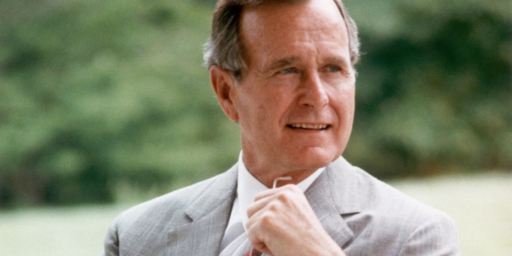
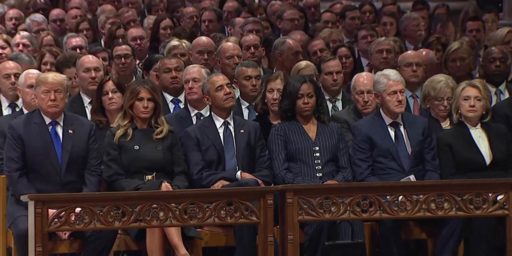
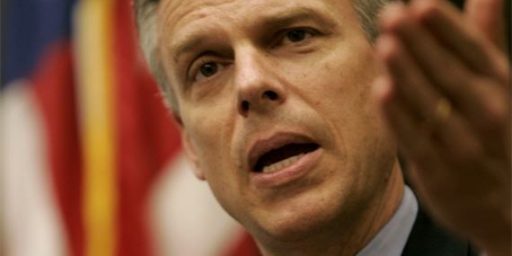
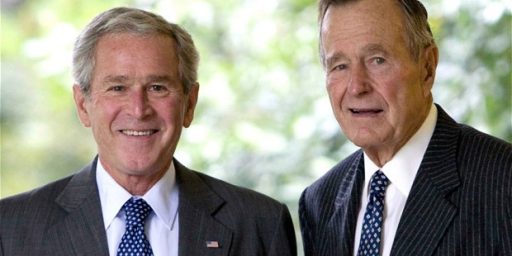
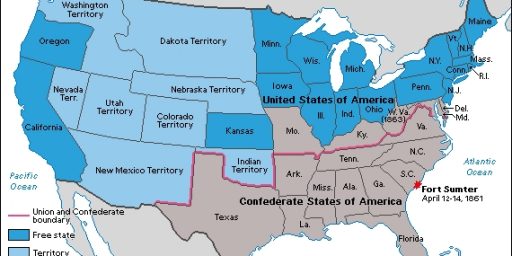
“With the exception of the Iraq war”????
“Aside from that Mrs. Lincoln, how was the play?”
Trump’s clearest achievement to date is making liberals miss George W. Bush.
When you study history, it is important, as many professors will remind you, to understand and to take into account the context of the times, when judging the actions of historical figures.
This is best understood when you live through a momentous time, then look back with 20/20 hindsight and full knowledge of the consequences, both intended and unintended.
Within the context of the immediate aftermath of 9/11 and after a swift, if inconclusive, war in Afghanistan, the decision to invade Iraq can be seen to make sense. Though even then, the lack of adequate planning, or even the certain knowledge that adequate planning was even possible, for post-invasion developments, was a bonehead move.
One wonders, too, what other options short of invasion and occupation were available at the time. things like airstrikes to force Saddam to readmit UN inspectors, for example, or limited military action for the same purpose.
He was a lousy president, I don’t give a rat’s constipated ass how much he was “genuinely trying to do for his country”. He ignored what he didn’t want to hear and there are American servicemen dead and maimed for life because of it, never mind the Iraqi dead and maimed – and you can bet he never minded them at all. He strutted across the deck of a battleship wearing a flight suit – you think Eisenhower would ever have done that? Playing dress-up like a child to show off how tough he was. And he inflicted Cheney on the nation. Gitmo. Torture.
He wasn’t Trump – that’s why he’s being rehabilitated. No other reason. He was lucky enough to still be alive when Trump got elected.
Call it the Trump Effect: Every past president will be looked at through rose-colored glasses for the next 10 to 20 years because of how appalling a person Donald Trump is.
I see this as a variation on Stockholm Syndrome.
@al Ameda:
Somewhere in Pennsylvania, James Buchanan is smiling in his grave.
George W. Bush is my favorite ex-president. I mean, he’s the guy I’m most glad is not president.
I like that he paints. You could call his creations grotesque and amateurish, but I wouldn’t. His portraits display an empathy and a love of humanity that seemed to be lacking in his administration. But I dunno, maybe that was Dick Cheney’s fault.
I will never think of Bush as a good President, given Iraq and the economy and Katrina and all that. But his anti-AIDS and anti-Malaria efforts, which he was talking about as the basic reason he wanted to run for President in the first place, have saved millions. That’s not nothing.
Don’t forget that little “worst economic collapse since the great depression” thing.
@Stormy Dragon: I’ve been rather consistent in giving presidents very little credit for good economies or blame for bad ones. There was a global economic collapse that had very little at all to do with who was sitting in the Oval.
@MarkedMan:
That was my thought, but even there, I think it gives Bush too much credit. With LBJ, for example, a good case can be made that if not for Vietnam he’d be remembered as one of the greatest presidents. Of course Vietnam changes everything (being responsible for the deaths of thousands is not something you can just shrug off), but the point I’m trying to make is that the polarity at least exists with him. With Bush, not so much. He’s the president who entered the White House during the biggest postwar economic boom and ended it amid the worst economic crisis since the Great Depression. He’s the president who gave us torture. He’s the president who took surpluses and converted them into massive deficits. He’s the president who mishandled Katrina. He isn’t the president to eliminate Social Security as we know it, but not for lack of trying.
James crows about how he “got major legislation passed in a bipartisan fashion” as if he deserves some kind of trophy for that alone, without even considering what the legislation was or how successful it’s been. And sorry, but it takes two to tango, and the fact is that he wouldn’t have gotten any of that bipartisan stuff done if Congressional Dems had treated him the way the Congressional GOP would go on to treat Obama.
We may know GWB as the last President to request Congressional authorization prior to going to war.
It’s hard to say how history will look on his Presidency. The Iraq war and the US support of torture may become the same sort of footnote the as the Philippine insurrection (and US torture) a century earlier, but it seems to me that Bush doesn’t have nearly the offsetting accomplishments that Teddy Roosevelt or even McKinley did.
Still don’t appreciate Bush’s good qualities. Anyone looks good compared to Trump.
” the decision to invade Iraq can be seen to make sense” Meh…
nope, still not buying that.
Yup, that “global economic collapse” just happened, like an earthquake or a hurricane. Had absolutely nothing to do with the revoking of restraints on the banks and investment funds that particular “who”‘s party pushed through Congress. No sirree Bob, it was just an act of God, a force of nature.
@Kylopod:
This is when historical context is necessary. In the immediate aftermath of 9/11, it would have been political suicide for any Democrats to oppose just about anything Bush the younger brought forth related to the attacks. Be it invading Afghanistan, the Patriot Act, or just about anything else. This is not an excuse, but it offers an explanation.
By 2003 and the invasion of Iraq, you need to look beyond 9/11, back to the 1991 Gulf War. Back then, a number of Democrats opposed the war in Congress. While this didn’t prove to be political suicide, it did kill a lot of prospective presidential runs.
Here I will cite Mark Twain, who claimed once one can learn too much from experience. He said it’s true a cat who tried to sit on a hot stove won’t do that again, but likely won’t try to sit on a cold stove either.
You know, compared to trump even the Bubonic Plague doesn’t look so bad.
Seriously tho, give Bush credit where credit is due: For his work on Aids and what he did in Africa.
Yeah yeah, Iraq, Katrina, fake voter fraud witch hunts, actual war crimes (torture is a war crime) but his post 9/11 leadership was a joke and the invasion of Afghanistan was an unforced error taken in a rush for revenge. Afghanistan was and remains a disaster (one that Obama doubled down on, for reasons I can not fathom). Most people do not want to take an honest look at that debacle because most people were screaming for blood and very few (me, 2 or 3 others) were saying “But then what?” or “This will not end well.” (17 yrs and counting)
But nobody cared then. And now every one wonders why the Bush Admin didn’t care about “But then what?” with Iraq.
If and until Trump drags us unto a ridiculous Middle East or Asiatic war W should be rated more negatively consequential. Also lets not forget the deficits; the Great Recession; the beginning of the coarsening of dialogue (e.g., Karla Tucker); etc. There is no doubt Trump’s character is far worse, but most of what he does can be undone- how do you undo 500,000 Iraqi dead.
@Kathy:
It only makes sense in a political sense. Most of the key players were involved with PNAC and had decided before W was elected that they wanted to invade Iraq. The reaction to 9-11 gave them a receptive political climate. All they had to do was cook the intel to support a decision already made.
As W himself didn’t quite say, “There’s an old saying in Tennessee—I know it’s in Texas, probably in Tennessee—that says, ‘Time wounds all heels..heels all shoes…’.”
@Kathy:
Excuse me, we forced the inspectors to leave Iraq specifically so we could start bombing the country. Because after all, the lack of evidence found by the inspectors was proof positive of how well the WMDs were hidden.
The election of Moqtada al Sadr proves the wisdom of getting rid of the Iraqi weapons of mass destruction. Much thanks Mr. Bush.
@gVOR08:
War is the continuation of politics by other means, so Clausewitz is crediting as having said. All war is certainly politics.
I do not justify the invasion and subsequent occupation of Iraq, even if I supported it at the time (we all make mistakes). But one has to keep in mind the mood at the time. No way Bush the younger would ever have been able to carry it out absent 9/11.
Also one has to remember the ultimate consequences of the war were not foreseen, and how much could have been foreseen is uncertain. When Roman officials decided to fleece the Goths seeking refuge within the Empire, they did not anticipate a major defeat of the Roman legions at Adrianople two years later. But they should, and easily could have, anticipated a revolt.
Saddam kept Iraq stable by force, mostly. Obviously toppling him would lead to instability. This could be easily anticipated. the Bush administration either did not anticipate it, or did not care to do something about it. I seriously don’t know what the hell they were thinking.
@Kathy:
No, it can’t.
The universal reaction of the Pentagon insiders I work with, at the time of the Iraq invasion, was “WTF!?”. Everyone knew instantly that it was a horrible mistake, an inexplicable move to open a second front for no reason* at a critical time of war. This is not 20/20 hindsight; it was obvious immediately.
And that “swift but inconclusive” war in Afghanistan? It had barely begun, much less ended, when Iraq was invaded.
*The professionals I work with were wholly unconvinced by the claims of WMD, and immediately wondered if W was trying to “end Daddy’s war”.